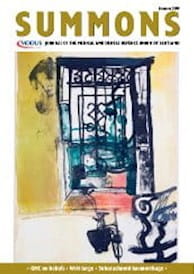ON 13 OCTOBER, 1951, a letter from two GPs appeared in The Lancet with a then radical proposal. It read:
“There is a College of Physicians, a College of Surgeons, a College of Obstetricians and Gynaecologists, a College of Nursing, a College of Midwives, and a College of Veterinary Surgeons… but there is no college or academic body to represent primarily the interests of the largest group of medical personnel in this country – twenty thousand general practitioners”.
Just over a year later on 19 November, 1952, The Royal College of General Practitioners was signed into existence in no small part due to the efforts of one of those two correspondents – Dr John Hunt.
John Henderson Hunt was born in 1905 in Secunderabad, India, his father an English surgeon in charge of the Nizam of Hyderabad’s State Railways. Hunt moved to England with his mother at an early age. He attended Charterhouse School and here had his first major brush with the medical world when consigned to the infirmary with diphtheria. His tonsils were guillotined after being painted with cocaine and Hunt reckoned it must have been about the last time that this procedure was carried out in Great Britain. He later wrote: “I remember quite a bit of pain and a lot of blood about…”
At age 18 he achieved an Exhibition at Balliol College, Oxford, and graduated with a 2:1 honours in physiology (firsts were rare then), in addition to winning the Theodore Williams scholarship in physiology in 1926. In one of the long breaks from university he took a ‘vacation’ with a friend, walking from Lands End to John O’Groats (despite having a deformed hip from childhood).
Hunt undertook his clinical training at St Bartholomew’s Hospital Medical School and later earned a doctorate from Oxford for his work on Raynaud’s syndrome. He passed his membership exam to the Royal College of Physicians of London in 1934.
Hunt had intended to seek a hospital career in general medicine and neurology and eventually landed a job as Chief Assistant to the Consultative Neurological Clinic at St Barts. But he grew disillusioned with his career choice and felt he had entered a “blind alley”, according to his colleague John Horder.
“Diagnosis fascinated him, but it was not enough,” Horder wrote. “In the neurology of 1935 effective treatments were few.”
No doubt there were many reasons but it still came as a surprise when in 1937 Hunt chose to become a general practitioner. Friends and colleagues were aghast and called it professional suicide.
That year he joined Dr George Cregan in practice at 83 Sloane Street and later married Elisabeth Evill. In 1939 at the outbreak of war John joined the Royal Air Force as a neurologist. On discharge (as Wing Commander) in 1945 he set up an independent practice in Kensington with his own laboratory and X-ray department but chose not to enter the National Health Service (NHS) in 1948. His private practice thrived with a list of wealthy and devoted patients.
In the years following the war Hunt became convinced of the need for a college for general practitioners – to supervise their education and postgraduate training, to ensure high standards of practice and to “act as a repository for its traditions”. In 1950 Hunt joined the Section of General Practice of the Royal Society of Medicine which, according to Horder, served as a “seed bed” for many of the ideas later established in the College.
In 1951 he proposed the idea for a college in a memorandum submitted along with other interested GPs to the General Practice Review Committee of the BMA. The proposal was incorporated into letters, co-signed by Dr Fraser Rose, both to the BMJ and The Lancet (quoted above). It provoked much favourable comment but also opposition, particularly from the presidents of the established Royal Colleges who no doubt thought it would fragment the profession and dilute their influence.
Hunt persevered and helped form a steering committee to look into the practical aims and needs of the proposed institution, and on 19 November 1952 the Memorandum and Articles of Association were signed and the College of General Practitioners formally established. Over 2,000 doctors joined in the first six months and Hunt played a central role in promoting the early organisation, serving as the first Honorary Secretary of Council and then President (1967-70).
Hunt’s central role in the formation of the College was acknowledged in the first annual report which put on record “…the measure of success so far achieved by the College would not have been possible without him”. Hunt enjoyed many honours as a result of his achievements. He was appointed CBE and in 1973 given a life peerage as Lord Hunt of Fawley.
He retired in 1981 due to failing eye sight and died in December 1987. Throughout his career he enjoyed the support of his wife Elisabeth, and among their five children (including a son who died in childhood) two would follow their father into general practice.
Sources
- Horder J, ed. The writings of John Hunt. London: RCGP 1992.
- RCGP Archives. John Hunt (1905-1987) Biography. Online. Available: www.rcgp.org.uk 17 Jun 2009.
This page was correct at the time of publication. Any guidance is intended as general guidance for members only. If you are a member and need specific advice relating to your own circumstances, please contact one of our advisers.
Read more from this issue of Insight

Save this article
Save this article to a list of favourite articles which members can access in their account.
Save to library